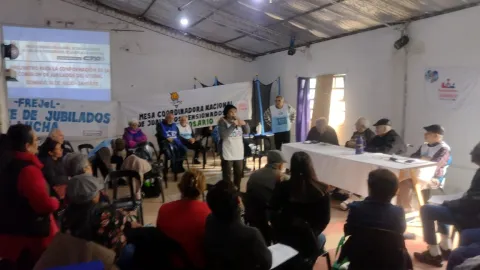
[7/31, 23:23] Quim Boix: Julio Gambina. Lic. Economy Member of the National Coordinating Board of Retirees and Pensioners of Argentina.
[7/31, 23:23] Quim Boix: Thank you comrades from Argentina for the clear answer and explanation
[7/31, 23:23] Quim Boix: I broadcast it worldwide in several languages except for the video that I only broadcast in Spanish because I don't have the necessary technique
[7/31, 23:23] Quim Boix: We have to learn from this response from the P&R of Argentina, to do what is appropriate in each country
THE COMRADES FROM ARGENTINA, WHO HAVE DIRECTED THEIR AUDIO TO ME, ANSWERED THIS:
Argentina. Agreement with the IMF: wage containment plan and rate update
By: Erika Cabrera, Latin American Summary, July 30, 2023.
The Palacio de Hacienda and the IMF reached an understanding to advance in the revision of the Argentine program.
As announced by Ámbito, the Government and the International Monetary Fund (IMF) reached an understanding this Friday to advance in the revision of the Argentine program and obtain the disbursements planned for the second half of the year.
Within the new understanding, it maintained the primary fiscal deficit goal at 1.9 of the Gross Domestic Product (GDP), which will require a "greater tightening of fiscal policy in the second half of this year," said the multilateral organization for credit.
Agreement with the IMF: wage containment, rate hikes and "targeting" of social spending and "rationalization of transfers"
The measures agreed between the IMF and the Palacio de Hacienda in order to meet this goal, provide for "containing the growth of the wage bill" with which it will seek to put a ceiling on the parities of the public sector.
In this sense, when consulted by Ámbito, María Castiglioni, director of C&T Asesores Económicos, pointed out that this measure is due to the fact that the IMF seeks to "lower public spending", to meet the deficit goal, and as public sector salaries “they are rising above inflation” the measure is aimed at “containing them”.
Likewise, another of the measures requests "to update energy rates to better reflect changes in production costs, while improving the progressivity of the system", for which the increases in the service, which are already being carried out, will be deepened. within the framework of the energy segmentation policy that the Ministry of Economy has been carrying out.
The latest measure seeks to "strengthen spending controls through better targeted social assistance and greater rationalization of current transfers to the provinces and state companies," the statement added.
In turn, the latest measures taken by the Ministry of Economy on the income side were highlighted: "The new taxes on access to foreign currency for imported goods and services, and the new measures to mobilize the liquidation of exports will help to compensate lower export duties resulting from the drought."
“The IMF is looking for the Government to take care of public spending, especially during the electoral period. During the first semester, the national administration had to lower the deficit and increased it, with which it is sought that it does not continue to rise,” Castiglioni said.
Agreement with the IMF: strong fiscal adjustment for the second semester
The fine print of the agreement will be known after the Primary, Open, Simultaneous and Mandatory elections (PASO) with which, although until now, as explained by the economist specialized in fiscal policy, Rafael Flores, he affirmed to this medium that up to now " There is a feeling that there was an agreement in which the Government gave in to the Fund's requirements in fiscal matters and partially in exchange matters."
As Flores explained and it is public knowledge, the organization was asking for a devaluation, which the Government was not willing to abide by due to the political cost that it would generate, for which "the solution was this kind of fiscal and sectoral devaluation, and the possibility was achieved to intervene in the exchange market if there is a principle of 'exchange run'“.
"In exchange for this possibility of intervening in the market, the Government had to make fiscal concessions and the goal of 1.9% of GDP was maintained, which is very challenging given the drop in income caused by the drought and the impact that had withholdings. This fiscal scenario appears challenging for the second half of the year and taking into account that it is an electoral period”, added the economist.
Although the Government has been making an adjustment in spending, "since there is a drop in real terms in the vast majority of the items, but this agreement will lead it to have to make a stronger adjustment in the second half of the year."
However, as Flores analyzed, the Government still has "a small margin of action", given that it was agreed that the fifth and sixth review be combined, for which the funds for June and September are unified and there will only be a new review.

